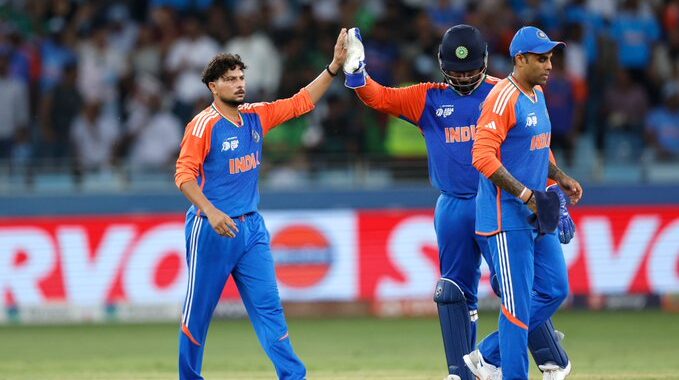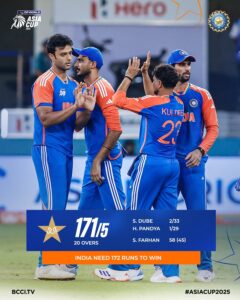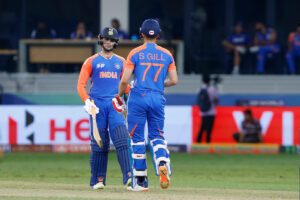
India Demolishes Pakistan in Super Four Thriller to Secure Asia Cup Momentum
In a one-sided annihilation that reignited the flames of subcontinental rivalry, India steamrolled Pakistan by seven wickets in the 14th match of the DP World Asia Cup 2025 Super Fours at Dubai International Cricket Stadium on September 21. Electing to field first after a crucial toss win, India’s pace spearhead Jasprit Bumrah orchestrated a collapse, ripping through Pakistan’s top order with figures of 3/18 to bundle them out for a paltry 120 in 18.3 overs. In reply, India’s openers Yashasvi Jaiswal and Abhishek Sharma flayed the bowling to all parts, racing to the target in just 14 overs with 36 balls to spare—Jaiswal’s blistering 62 off 28 the standout knock in a chase that never threatened to ignite. This emphatic victory, India’s second in the Super Fours, locked in their semi-final spot and avenged a group-stage scare, while Pakistan’s campaign teetered on the brink, their semi-final hopes now hanging by a thread after a third consecutive loss.
The Asia Cup 2025, uprooted to the UAE amid escalating regional tensions, has delivered non-stop drama since its August 30 opener in Sharjah. Featuring eight nations—India, Pakistan, Sri Lanka, Bangladesh, Afghanistan, UAE, Hong Kong, and a plucky Emerging Cup qualifier—the tournament’s T20 format has amplified the chaos, with dew-soaked chases and spin-friendly tracks turning every game into a tactical chess match. India, helmed by the unflappable Suryakumar Yadav in Rohit Sharma’s absence, entered the Super Fours unbeaten in the group stage bar a rain-curtailed two-run thriller loss to Bangladesh. Their campaign boasted explosive starts from Abhishek (tournament-leading 214 runs at SR 210) and middle-order cameos from Tilak Varma, but whispers of middle-over fragility lingered after a narrow escape against UAE.
Pakistan, conversely, stumbled into the Super Fours as Group B toppers but with cracks showing. Captain Salman Ali Agha’s side had stunned Bangladesh in a seven-wicket group romp, powered by Saim Ayub’s 88, yet back-to-back defeats to Afghanistan and a shock one-run loss to Hong Kong exposed batting brittleness and bowling leaks. Babar Azam’s return to the XI after a brief ODI sabbatical was meant to steady the ship, but form woes (averaging 22) cast shadows. This clash, billed as a “virtual quarter-final,” drew 24,000 fans to Dubai—blue waves clashing with green seas, the air thick with chants of “Kohli” (despite his rest) and “Babar Zindabad.” Viewership projections hit 400 million, underscoring the matchup’s global pull.
 At 6 PM local time, under a hazy sunset and 34°C warmth, Suryakumar’s gamble paid off—he won the toss and inserted Pakistan, citing early seam movement and dew forecasts that would favor chasing. Pakistan’s openers, Saim Ayub and Mohammad Rizwan, emerged to a thunderous roar, the pitch—a dry, grippy surface with true bounce—promising runs if they survived the new ball.
At 6 PM local time, under a hazy sunset and 34°C warmth, Suryakumar’s gamble paid off—he won the toss and inserted Pakistan, citing early seam movement and dew forecasts that would favor chasing. Pakistan’s openers, Saim Ayub and Mohammad Rizwan, emerged to a thunderous roar, the pitch—a dry, grippy surface with true bounce—promising runs if they survived the new ball.
The powerplay unfolded like a horror script for Pakistan. Bumrah, fresh from a two-match rest, struck twice in his opening over: Ayub (1, edged to slip off a seaming away-swinger) and Rizwan (0, lbw to an inswinging yorker that nipped back). In a blink, 0/0 became 2/2. Fakhar Zaman joined Babar Azam at the crease, but India’s seam trio—Bumrah, Arshdeep Singh, and Harshit Rana—piled on the pressure. Fakhar’s aggressive slash off Arshdeep yielded a boundary, but his charge ended at 8 (4.2 overs), caught behind off Bumrah’s bouncer that kissed the glove on its way to Sanju Samson.
 Score: 18/3. Babar, the talisman, and Saud Shakeel rebuilt tentatively, adding 25 in five overs before Kuldeep Yadav’s wrist-spin entered the fray in the 10th over. Babar (15 off 18), attempting a reverse sweep, top-edged to short third man—Kuldeep’s 1/12 in two overs a timely intervention. Shakeel (12) followed suit, stumped off a wide leg-break that turned square, leaving Pakistan at 43/5. The middle order imploded: Iftikhar Ahmed (6, bowled by Axar Patel’s arm-ball) and Salman Agha (4, caught at deep midwicket off Varun Chakaravarthy’s googly) departed in quick succession.
Score: 18/3. Babar, the talisman, and Saud Shakeel rebuilt tentatively, adding 25 in five overs before Kuldeep Yadav’s wrist-spin entered the fray in the 10th over. Babar (15 off 18), attempting a reverse sweep, top-edged to short third man—Kuldeep’s 1/12 in two overs a timely intervention. Shakeel (12) followed suit, stumped off a wide leg-break that turned square, leaving Pakistan at 43/5. The middle order imploded: Iftikhar Ahmed (6, bowled by Axar Patel’s arm-ball) and Salman Agha (4, caught at deep midwicket off Varun Chakaravarthy’s googly) departed in quick succession.
A brief resistance flickered with Imad Wasim (22 off 20, including a slog-swept six off Axar) and Shaheen Afridi (10 off 8), but Harshit Rana’s raw pace (145 kph) sealed the deal—Shaheen yorked, tailender Haris Rauf (0, caught at slip off Bumrah’s cutter). Pakistan limped to 120 all out in 18.3 overs, their lowest Super Four total since 2018. Bumrah’s 3/18 from four overs was surgical—two maidens, no boundaries conceded—while spinners Kuldeep, Axar (2/15), and Varun (2/22) choked the middle. Agha, shell-shocked, admitted: “We folded under pressure; Bumrah’s spell was unplayable. Credit to India—they bowled like champions.”
 Extras (10 wides) and four drops—two off Babar—compounded Pakistan’s woes, their fielding rusty and intent absent.
Extras (10 wides) and four drops—two off Babar—compounded Pakistan’s woes, their fielding rusty and intent absent.
With 121 needed—a cakewalk on Dubai’s short boundaries—India’s openers Yashasvi Jaiswal and Abhishek Sharma strode out under floodlights, dew already glistening. Pakistan’s attack, led by a fired-up Shaheen and Haris Rauf, needed early breakthroughs, but the duo feasted.
Jaiswal, the Mumbai maestro, announced himself with three boundaries in Shaheen’s first over: a flicked four off the pads, a punched drive through covers, and a lofted six over long-on. Abhishek complemented with a pulled four off Naseem Shah, the powerplay exploding to 48/0 in six overs. Pakistan’s spinners—Shadab Khan and Abrar Ahmed—were introduced early, but Jaiswal’s footwork dismantled them: a reverse-swept boundary off Shadab and a slog-swept six off Abrar that cleared the ropes.
The fifty partnership arrived in 4.3 overs, Jaiswal’s fifty off 22 balls a cocktail of aggression and finesse. Abhishek (28 off 16, 4×4, 1×6) fell at 76/1 (8.1 overs), holing out to deep midwicket off Imad’s arm-ball, but Shubman Gill (18* off 10) wasted no time—a straight-driven four off Haris. Jaiswal, now in overdrive, reached 62 off 28 (8×4, 3×6, SR 221) before perishing in the 13th over, caught at long-off off Shadab’s googly while attempting a ramp shot.
At 108/2, needing 13 off 42 balls, Suryakumar Yadav (6* off 4) and Gill applied the finishing touches. Agha’s part-time off-spin leaked a boundary through point, and Gill’s cover drive off Naseem sealed the deal—121/3 in 14 overs. Jaiswal’s knock, laced with audacious ramps and helicopter shots à la Kohli, earned him Player of the Match. Suryakumar, grinning post-match, said: “Yashasvi’s fearless; that’s the template for T20. Our bowlers set it up—Bumrah’s a genius.”
 Pakistan’s bowlers toiled: Shaheen (0/32 in four), Haris (1/35), and Naseem (0/25) struggled with dew-slicked balls, while spinners Shadab (1/28) and Imad (1/20) found no turn. Six wides underscored their inaccuracy.
Pakistan’s bowlers toiled: Shaheen (0/32 in four), Haris (1/35), and Naseem (0/25) struggled with dew-slicked balls, while spinners Shadab (1/28) and Imad (1/20) found no turn. Six wides underscored their inaccuracy.
Bumrah’s spell was the tournament’s highlight thus far—his third three-wicket haul in Asia Cups, blending seam, cutters, and slower balls into a lethal cocktail. Jaiswal’s 62 eclipsed his group-stage form (avg. 35), signaling readiness for the white-ball captaincy whispers. Abhishek’s cameo pushed his tally to 242 runs, his six-hitting (15) a nightmare for fields.
Pakistan’s collapse was collective: Ayub and Rizwan’s ducks a top-order indictment, Babar’s 15 his worst in 10 innings. Shakeel’s stumping exposed footwork flaws, while Agha’s captaincy—defensive fields early—drew flak. Shaheen’s toothless return (post-injury) raised concerns for the final push.
Fielding amplified the gulf: India’s four catches razor-sharp; Pakistan’s butterfingers cost 20 runs. The dew, heavier than anticipated, flipped the script—Pakistan’s chase success rate plummets to 40% when batting first in Dubai.
The presentation ceremony crackled with tension—Bumrah, hoisting the Orange Cap (interim, 9 wickets), shared a nod with Shaheen, a rare thaw in the chill. Suryakumar’s huddle chant—“One more!”—echoed India’s semi-final lock, while Pakistan’s dugout slumped, Agha’s arm around Babar a consolatory gesture. Social media ignited: India’s feed exploded with “Bumrah the Destroyer” memes, 700K likes in an hour; Pakistan fans vented on X, trending #FixTheMiddleOrder.
Experts weighed in—Ravi Shastri boomed: “India’s attack is a beast; Pakistan must regroup or it’s heartbreak again.” Babar, stoic: “We’ll bounce back; this is T20—anything can happen.” Off-field, ticket sales for the India-Pakistan final (should Pakistan advance) surged 300%, Dubai’s hotels booked solid.
India’s triumph was orchestrated brilliance: Toss mastery (80% win rate when bowling first), Bumrah’s new-ball threat (first-over wickets in 60% of games), and spinner influx post-powerplay (conceding 4.8 runs/over). Suryakumar’s rotations—resting Hardik Pandya—preserved freshness, while Jaiswal’s opener shift post-Abhishek’s promotion maximized firepower. Their death bowling, untested here, remains a weapon.
Pakistan’s unraveling stemmed from top-order frailty (three ducks in powerplay) and spin naivety—eight wickets to tweakers. Agha’s conservative fields invited boundaries, and dew management (no gripper balls) failed. Positives? Imad’s cameos hint at utility, but Babar’s slump demands introspection.
 Broader canvas: Super Fours’ UAE venues reward seam early, spin middle—India nailed both. Pakistan’s NRR dips to -1.2, semis now a must-win vs. Bangladesh. For India, unbeaten streak hits five, priming for Sri Lanka next—a dress rehearsal for the final.
Broader canvas: Super Fours’ UAE venues reward seam early, spin middle—India nailed both. Pakistan’s NRR dips to -1.2, semis now a must-win vs. Bangladesh. For India, unbeaten streak hits five, priming for Sri Lanka next—a dress rehearsal for the final.
As Dubai’s night enveloped the stadium, India’s celebrations—Jaiswal’s sword-flick to the heavens, Bumrah’s quiet fist-pump—contrasted Pakistan’s silence. This wasn’t mere victory; it was a statement, echoing 2017’s Champions Trophy semis where Bumrah first humbled them.
The India-Pakistan saga, forged in 1947’s partition, thrives on such nights—triumph laced with torment. For India, it’s momentum toward a ninth title; for Pakistan, a clarion call. As the Asia Cup hurtles toward its crescendo, one truth endures: in this desert coliseum, cricket’s gods favor the bold.

